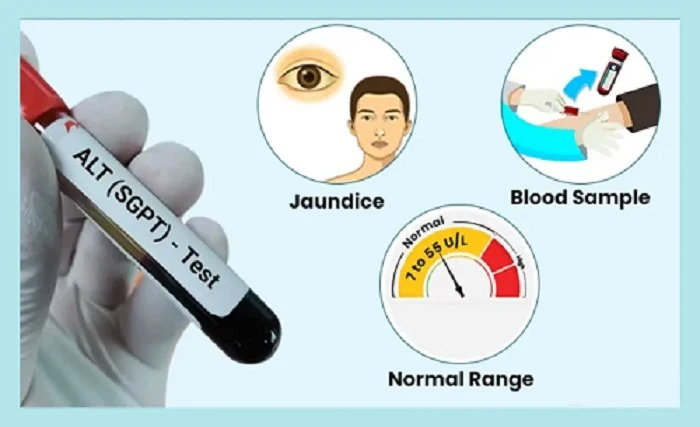-

-
-
Loading
Loading

Loading

The SGPT full form is (Serum Glutamic Pyruvic Transaminase), SGPT Test is done to examine the levels of GPT in the blood. GPT or glutamic pyruvic transaminase is an enzyme that is produced by the heart, liver, muscle, and kidney cells. Although, the test is mostly done to check the condition of the liver and assess the potential risk to its functioning due to an underlying condition. One other name for SGPT is ALT or Alanine Aminotransferase which has the same characteristics as SGPT. It is attached to the liver parenchymal cells and is found in human tissues.
SGPT test is useful in detecting various health conditions such as cirrhosis, hepatitis, etc., that are liver diseases. The test helps to identify the real cause behind the liver damage and therefore it can be managed properly. The test involves a blood sample that is taken with the help of a needle prick and is sent to the labs for testing.
SGPT, which is also known as Serum Glutamic Pyruvic Transaminase is a kind of enzyme that is present in the liver and plays an important role in the metabolism of body. The health of the liver is essentially assessed by the SGPT Test. If there’s a risk of a potential liver disease, the SGPT test along with SGOT can assess that and help in taking the right step to cure the same.
The SGPT normal range is between 7 to 55 U/L, but it also depends on the factors such as age, gender, family history of diseases, present health condition, lifestyle, etc. if the levels are higher than the normal level, they signify liver damage due to underlying health conditions. Regular tests are therefore necessary to maintain the normal levels and liver health to avoid serious complications. If you are experiencing symptoms such as abdominal pain, frequent urination, nausea, fever, etc., it is possible that there is an underlying condition that could affect your liver health and therefore taking this test is essential.
The test helps in detecting liver related diseases and identifies potential risk to the liver. It is useful in detecting the impact of medications and treatment that the individual is taking to cure a liver disease. People who are at a high risk of a liver damage need to get this test and take a follow-up with their doctor if there’s a need for any additional tests. The need of the test is due to following reasons:
For men, a typical Alt - SGPT Normal Range of 29 50 33 U/L is normal, whereas in women, the normal range between 19 to 25 U/L is considered normal. The normal range is higher in men rather than women. A range between 7 to 55 U/L is a normal range but it also depends on various factors such as age, gender, health condition, etc. Any value lower or higher than the normal range is considered dangerous and indicates liver damage.
Following health problems can occur if the SGPT & SGOT levels are higher than normal, such as:
The levels of SGPT (serum glutamic pyruvic transaminase) increase because of the following causes that mainly affect the liver as well as other organs:
A regular testing for ALT- (Alanine Transaminase) SGPT Test helps in maintaining a healthy liver. If the SGPT levels are not maintained regularly, it might cause alarming health problems and could cause liver damage. Along with regular checkups, self-care is equally important to decrease the risk of liver diseases. This process can become easier if you consult with a healthcare professional on a regular basis who can guide you through the importance of tests, treatment, and lifestyle changes.
Conclusion
SGPT (Serum Glutamate Pyruvate Transaminase) test is a useful test in detecting various liver-related diseases, potential risk of ailments, disorders, progress of treatments, and medications, and find out the exact underlying cause of the liver damage. People who are at risk of these diseases should maintain a habit of taking these tests regularly. Apart from that, people already taking a treatment or medication for a liver-related disease should take this test frequently to see the progress of their treatment and move ahead accordingly with their treatment.
Having said that, it is extremely important to maintain a healthy lifestyle to avoid such complications as much as possible. Some lifestyle changes can start from consuming healthy & nutritious food that includes leafy vegetables, fruits, nuts, etc., staying hydrated, doing exercise regularly, and taking health checkups to stay aware about your present physical condition. You must also avoid consuming alcohol if you are already suffering from a liver damage, and if you cannot quit at once, try to take it in a moderate quantity. By following these steps, you can control your health in a long run and maintain a healthy lifestyle.
Medically Reviewed By Dr. R K Aggarwal